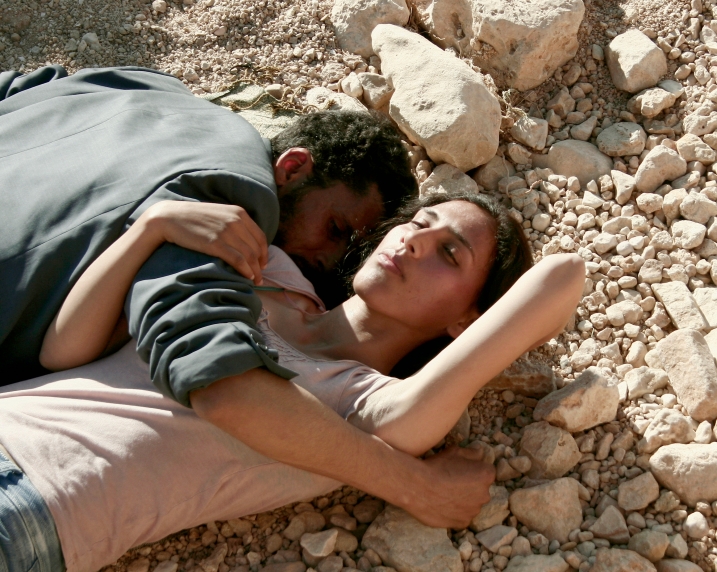THE CURSE is a powerful social parable about the conflict between the personal freedom and the social conventions.FYZAL BOULIFA is a British filmmaker of Moroccan descent. He is the writer and director of several short films including BURN MY BODY, described by Sight & Sound as ‘extreme’, ‘unfortunate’ and ‘expertly directed’, and WHORE, winner of Best UK Short at London East End Film Festival and Grand Prix du Jury at Angers Premiers Plans 2010. This is a brief thought-provoking journey into his aims as a young filmmaker.
Ioana Mischie: THE CURSE seems from the very first seconds a breath-taking imago mundi, a parable portraying humanity. Where did you discover and how did you develop the idea of this story? Also, after having the whole story set up, how long lasted the shooting?
Fyzal Boulifa: My greatest hope for the film was a simplicity which would resonate beyond itself, so it’s moving for me to hear the film described in that way. The idea is based on an anecdote from my mother’s teenage years – from the poor town she lived in she would walk into the wilderness, where she had clandestine meetings and was once caught and was once followed home – as we see in the middle of the film. In my mind it took on the atmosphere of a fable or a fairytale – the time when our parents were young seems like ancient history, right? And I was born in England so, even though it isn’t at all, Morocco seems somehow distant.
In the shoot, we wanted to preserve this atmosphere. One way was the texture of 16mm. We chose an especially grainy stock that handled colour delicately. We wanted the characters to seem like those in a picture book; we often shot them frontally and kept the environment very simple, almost abstracted.
We shot for 9 days in the rural part of Chichaoua, about an hour from Marrakech. Since it was in January, we had very short days.
Ioana Mischie: The children (scary homo ludens) blackmailing Fatine seem to play initially, but this is no ordinary game: they play with broken feelings, with judgments. And when everything might come to an end, the curse is only beginning: it’s a game with more than one round, it might last a lifetime. What motivated you to opt for this spherical ending and why are the children the catalysts of this spiritual Holocaust?
I agree, the curse seems to be all-seeing and endless. Children are a good metaphor for a wider society, particularly in a short film, because their identities are amorphous; they are less defined by manners – so we can get to the heart of the issue rather quickly. Yes, they are cruel and manipulative – but they are also pathetically ruled by basic whims and lacking in self-awareness. Perhaps this is the most terrifying aspect of the curse – appallingly, everyone is innocent. In the picnic scene what makes Fatine cry is the fact she no longer even has an enemy.
Ioana Mischie: The cast is absolutely stunning: unprofessional actors fill the screen with their striking expressiveness. How did you cast Fatine and the children and how hard was to work with them? How many rehearsals did you make?
Fyzal Boulifa: Thank you! I’m extremely proud of them. Ibtissam Zabara, who plays Fatine, was initially very shy – but her presence, as it revealed itself in tiny gestures and her striking face, captured my imagination. I therefore cast her despite very weak auditions. I think in making a film, casting is the place you have to make the most frightening leaps into the unknown – it felt like a big risk. I like to think that if you can have the courage to listen your instincts that it will all work out. Maybe that’s idealistic but in this case, it did.
I don’t find rehearsals at all useful other than to get performers used to having a camera around. I make them do mundane things, like household chores, and film them until the prospect of a camera becomes boring. We don’t discuss psychology because the character should already be there in the face, in the body. After that, it’s a case of just seeing what will happen on set. I don’t give a script to the actors – I don’t think you should begin with a strong notion of right and wrong, of something already existing. We shot a very high ratio and especially with the younger children, I found long takes were helpful. Somewhere along the way, they can forget themselves and give you the beautiful, enigmatic gesture or facial expression you need.
Ioana Mischie: Becoming captive of their rude game, Fatine has no other choice than to act how they dictate. In a capitalist world where Twix, Mars and Coca-Cola seem to value much more than someone’s integrity, ethical values seem to be replaced by instincts. In the film, society seems to become almost a prison which dictates everything. How do you perceive the contemporary society and how would you characterize its flaws and positive aspects?
Fyzal Boufila: Fatine is first accused of being a prostitute and then seems to have no choice but to become one. I suppose one of the things I was interested in was how much her fate is dictated by the society surrounding her and what part she plays in it herself. If she has no choice, indeed is part of a machine, then where is the magical part of Fatine that makes her a person? In the West at least we live a capitalist cult of individuality – but that could be a fantasy, a collective daydream. Perhaps Fatine’s curse is that she isn’t an individual? Or maybe it’s that she is? What the curse is for me is always changing.
Ioana Mischie: What are your future aims as a young filmmaker? Could you tell us what film projects are you planning?
Fyzal Boulifa: I am working towards my first feature film. It’s again about individuality and the themes I mention above, but in the context of the UK and contemporary technology and pop culture. My hope for it is to be both the darkest and the funniest thing I have written. Constantly seeing yourself is kind of sick isn’t it? I grew up on horror movies so I’m finding they are having an unexpectedly large influence. At the same time, I’m dedicating to developing work within the MENA region – it leads me to different kinds of stories and Morocco was a wonderful place to work.
More about THE CURSE.


